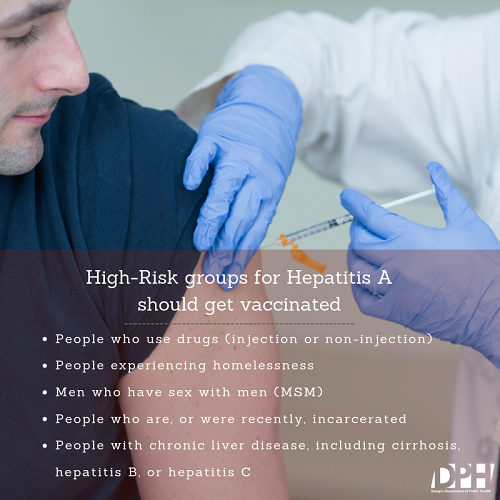
Are you at High Risk for Hepatitis A? Get vaccinated.
By Julie Jordan
Published April 15, 2019

Georgia is experiencing outbreaks of hepatitis A, a highly-contagious, vaccine-preventable liver infection caused by the hepatitis A virus (HAV). Hepatitis A spreads when a person unknowingly ingests the virus from objects, food or drinks contaminated by small, undetected amounts of feces (poop) from an infected person. Hepatitis A can spread easily through close personal contact with an infected person, such as household or sexual contacts, or from caring for someone who is ill.
Since June 2018, the Georgia Department of Public Health has identified hundreds of acute hepatitis A virus infections statewide, and the numbers continue to increase. This mirrors the large HAV outbreaks that have been occurring in other states among injection and non-injection drug users, homeless populations and men who have sex with men.
The best way to prevent HAV infection is by getting vaccinated against the hepatitis A virus. Children are vaccinated at 12 months of age; however, many adults remain unvaccinated and at risk for becoming infected with HAV. These groups are at high risk for infection and should get vaccinated:
- People who use drugs (injection or non-injection)
- People experiencing homelessness
- Men who have sex with men (MSM)
- People who are, or were recently, incarcerated
- People with chronic liver disease, including cirrhosis, hepatitis B, or hepatitis C
In addition to being vaccinated, wash your hands with soap and water after using the bathroom and before eating or preparing food to help stop the spread of hepatitis A.
Hepatitis A symptoms include:
- Yellow skin or eyes (Jaundice)
- Joint pain
- Fever
- Fatigue
- Loss of appetite
- Nausea
- Vomiting
- Abdominal pain
- Dark urine
- Diarrhea
- Clay-colored stools
Symptoms range from mild to severe and last a few weeks to several months. Rarely, hepatitis A causes death. Some people will need medical care in a hospital.
A health care provider can determine if you have hepatitis A by discussing your symptoms and taking a blood sample. Health care providers should report patients with hepatitis A infection to their local public health department or by calling 1-866-PUB HLTH (1-866-782-4584).